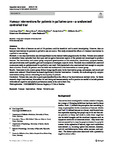Humour interventions for patients in palliative care—a randomized controlled trial
| dc.contributor.author | Linge-Dahl, L | |
| dc.contributor.author | Kreuz, R | |
| dc.contributor.author | Stoffelen, M | |
| dc.contributor.author | Heintz, Sonja | |
| dc.contributor.author | Ruch, W | |
| dc.contributor.author | von Hirschhausen, E | |
| dc.contributor.author | Radbruch, L | |
| dc.date.accessioned | 2023-02-28T17:06:20Z | |
| dc.date.issued | 2023-02-13 | |
| dc.identifier.issn | 0941-4355 | |
| dc.identifier.issn | 1433-7339 | |
| dc.identifier.other | 160 | |
| dc.identifier.uri | http://hdl.handle.net/10026.1/20519 | |
| dc.description.abstract |
<jats:title>Abstract</jats:title><jats:sec> <jats:title>Purpose</jats:title> <jats:p>The effect of humour on end-of-life patients could be beneficial and is worth investigating. However, data on humour interventions for patients in palliative care are scarce. This study evaluated the effects of a humour intervention in a palliative care setting.</jats:p> </jats:sec><jats:sec> <jats:title>Methods</jats:title> <jats:p>A two-step intervention was developed based on the humour habits programme by McGhee. Patients were assisted to remember funny episodes from their past and recognize humorous aspects of the present and encouraged to produce humour. The intervention and control group completed questionnaires on life satisfaction, cheerfulness, symptom burden, and perceived stress and if possible gave saliva samples to investigate oxytocin levels. The study was a randomized controlled monocentre study on patients treated in a palliative care ward. Participants had to be conscious and alert enough to complete data collection. Overall, 55 patients were included and randomized to the intervention or control group.</jats:p> </jats:sec><jats:sec> <jats:title>Results</jats:title> <jats:p>Parameters in the control group did not change significantly. In the intervention group, seriousness, bad mood, and stress were reduced. Cheerfulness increased significantly after the intervention. However, the methodologically complex intervention setting was too exhausting for the majority of patients.</jats:p> </jats:sec><jats:sec> <jats:title>Conclusion</jats:title> <jats:p>Patients who were able to participate benefited from the effects of the intervention on multiple levels. For future research simple interventions, biomarkers for well-being and assessments by staff or proxies are needed to include patients with reduced cognitive and physical performance status at the end of their lives.</jats:p> </jats:sec><jats:sec> <jats:title>Trial registration</jats:title> <jats:p>DRKS00028978 German Registry of Clinical Studies.</jats:p> </jats:sec> | |
| dc.format.extent | 160- | |
| dc.format.medium | Electronic | |
| dc.language | en | |
| dc.language.iso | eng | |
| dc.publisher | Springer Science and Business Media LLC | |
| dc.subject | Humour | |
| dc.subject | Intervention | |
| dc.subject | Patient | |
| dc.subject | Palliative care | |
| dc.title | Humour interventions for patients in palliative care—a randomized controlled trial | |
| dc.type | journal-article | |
| dc.type | Randomized Controlled Trial | |
| dc.type | Journal Article | |
| plymouth.author-url | https://www.webofscience.com/api/gateway?GWVersion=2&SrcApp=PARTNER_APP&SrcAuth=LinksAMR&KeyUT=WOS:000933256900002&DestLinkType=FullRecord&DestApp=ALL_WOS&UsrCustomerID=11bb513d99f797142bcfeffcc58ea008 | |
| plymouth.issue | 3 | |
| plymouth.volume | 31 | |
| plymouth.publication-status | Published | |
| plymouth.journal | Supportive Care in Cancer | |
| dc.identifier.doi | 10.1007/s00520-023-07606-9 | |
| plymouth.organisational-group | /Plymouth | |
| plymouth.organisational-group | /Plymouth/Faculty of Health | |
| plymouth.organisational-group | /Plymouth/Faculty of Health/School of Psychology | |
| plymouth.organisational-group | /Plymouth/REF 2021 Researchers by UoA | |
| plymouth.organisational-group | /Plymouth/REF 2021 Researchers by UoA/UoA04 Psychology, Psychiatry and Neuroscience | |
| plymouth.organisational-group | /Plymouth/REF 2021 Researchers by UoA/UoA04 Psychology, Psychiatry and Neuroscience/UoA04 Psychology, Psychiatry and Neuroscience MANUAL | |
| plymouth.organisational-group | /Plymouth/Research Groups | |
| plymouth.organisational-group | /Plymouth/Research Groups/Plymouth Institute of Health and Care Research (PIHR) | |
| plymouth.organisational-group | /Plymouth/Users by role | |
| plymouth.organisational-group | /Plymouth/Users by role/Academics | |
| dc.publisher.place | Germany | |
| dcterms.dateAccepted | 2023-01-23 | |
| dc.rights.embargodate | 2023-3-1 | |
| dc.identifier.eissn | 1433-7339 | |
| dc.rights.embargoperiod | Not known | |
| rioxxterms.versionofrecord | 10.1007/s00520-023-07606-9 | |
| rioxxterms.licenseref.uri | http://www.rioxx.net/licenses/all-rights-reserved | |
| rioxxterms.licenseref.startdate | 2023-02-13 | |
| rioxxterms.type | Journal Article/Review |


